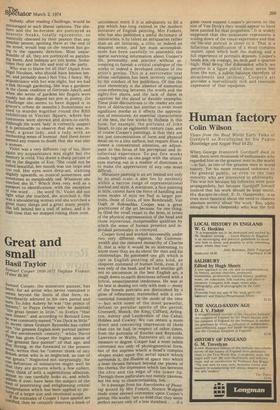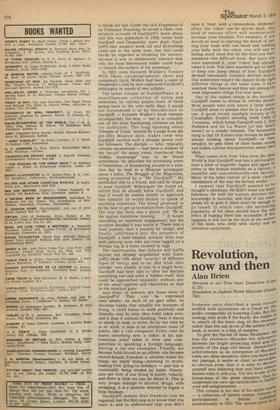Human factory
Colin Wilson
Views from the Real World Early Talks of Gurdjieff as,Recollected by his Pupils (Routledge and Kegan Paul £4.25) When George Ivanovich Gurdjieff died in 1949, there_ were thousands of enthusiasts who regarded him as the greatest man in the world —in fact, as one of the greatest men in world history. Yet his name remained unknown to the general public, or even to the tiny minority who are interested in philosophy. This was not because his followers were poor propagandists, but because Gurdjieff himself insisted that his work should be kept secret. His disciple-in-chief, P. D. Ouspensky, was even more fanatical about the need to observe absolute secrecy about 'the work.' But, oddly enough, it was Ouspensky who was the first
to break the ban. Under the title Fragments of an Unknown Teaching, he wrote a clear, con
secutive account of Gurdjieff's main ideas, and this was published in 1950, when both Gurdjieff and Ouspensky were dead. Gurd
jieff's own massive work All and Everything
came out in the same year; but this could hardly be regarded as breaking the secrecy, because it was so deliberately obscure that only the most determined reader could hope to scratch the surface of his meanings.
In 1951 came Kenneth Walker's Venture With Ideas, autobiographical, short and completely lucid. Walker had been a pupil of
Ouspensky's and he now explained Gurdjieffs philosophy in words of one syllable.
The latest volumn of Gurdjieffiana is a miscellaneous collection of notes and memories, by various pupils, most of them dating back to the very early days. I would not recommend it as an introduction to Gurdjieff — Kenneth Walker's book remains incomparably the best — but it is certainly one of the most fascinating volumes on him vet published. The long opening essay 'Glimpes of Truth,' written by a pupil from the pre-1914 Moscow days, makes clear why Gurdjieff exerted such a strange power over his followers. The disciple — who, typically, remains anonymous — had been a student of the 'occult' for many years, convinced that 'hidden knowledge' was to be found somewhere. He describes his increasing sense of frustration, of floundering around in a mist. One day he read in a Moscow newspaper about a ballet, The Struggle of the Magicians, being presented by a "Mr Gurdjieff." He mentioned this to a friend, and said he hoped to meet Gurdjieff. Whereupon the friend admitted that he already knew Gurdjieff, and that it would be useless merely to approach him casually; he would decline to speak of anything important. The friend promised to do his best to get an invitation from Gurdjieff. The next day there was a phone call: "Be at the station tomorrow evening . . ." It meant cancelling an important engagement, but the occultist decided it was worth it. There was a train journey, then a journey by sledge, and finally, admittance into the presence of Gurdjieff, a bald headed, oriental little man with piercing eyes, who sat cross legged on a Persian rug in a room covered in rugs.
The conversation that follows will baffle anyone not already acquainted with Gurdjieff's ideas: talk about 'octaves', of different types of energy and so on. But what does emerge, very clearly, is that in a single hour, Gurdjieff had been able to offer the disciple something real and solid, a 'hidden truth' that could be approached rationally, without any of the usual vagaries and obscurities so dear to the mystical guru.
And what, in essence, are these ideas of Gurdjieffs? They can be expressed very simply. As each of us gets older, he develops habits that simplify the business of living. A child learns to walk painfully and clumsily, step by step; then habit takes over, and it does it without thinking. Next it learns to speak, to read, to write. So by the time he is an adult, a man is an enormous mass of habits, like a vast computer. Every time he learns something new, a 'robot' in his subconscious mind takes it over and computerises it: speaking a foreign language, driving a car are examples. Finally, we become habit-bound as an athlete can become muscle-bound. Freedom is another name for things we enjoy doing—listening to music, making love, going on holidays — and this is continually being eroded by habit. Ninetynine per cent of our living is purely 'robotic' and there is little we can do about it. This is why people indulge in alcohol, drugs, wife swapping: it is a pathetic attempt to regain a little freedom.
Gurdjieff insists that freedom can be regained, but the first step is to know that you want it, and to understand that you don't have it. Next, with a tremendous, deliberate effort, the 'robot' can be driven back. Any kind of serious effort will momentarily increase your freedom. For example, if yuti devote an hour to learning the knack of pat ting your head with one hand and rubbing your belly with the other, you will end bY feeling much more free by the time you have mastered this difficult trick. But once you have mastered it, your 'robot' has alreadY taken it over. You have somehow got to learn to keep one jump ahead of him. Gurdjieff devised immensely complex dervish dances that sometimes require the dancer to do eight different things at the same time. I have watched these dances and they are among the most impressive things I've ever seen.
One of the oddest things is the hostilitY Gurdjieff seems to arouse in certain people. Most people who only know a little about Gurdjieff seem to assume that he is a charlatan. A good recent example occurs in Dr, Christopher Evans's amusing book Cults 01 Unreason, which lumps Gurdjieff with L. Ron Hubbard and De La Warre (of the 'black boxes') as a cranky messiah. The interesting thing is that Dr Evans's text reveals he knows almost nothing about Gurdjieff. or Ous' pensky); he gets titles of their books wrong and makes curious mis-statements about their ideas. What comes over from View from the Real World is that Gurdjieff was less a philosopher than a kind of engineer. Again and again he refers to the human machine as a factory, a wasteful and uneconomically-run factory. Many of his talks consist of a slow, careful examination of the way the factory works. I suspect that Gurdjieff wanted to be thought a charlatan. He didn't want too many followers. He held the curious doctrine that knowledge is material, and that if too manY people try to grab it, there won't be enough to go round. In which case, the increasing popularity of his ideas should have the odd effect of making them less accessible. If this happens, it will not be the fault of the writers of this book, who write with clarity and an infectious excitement.

































 Previous page
Previous page